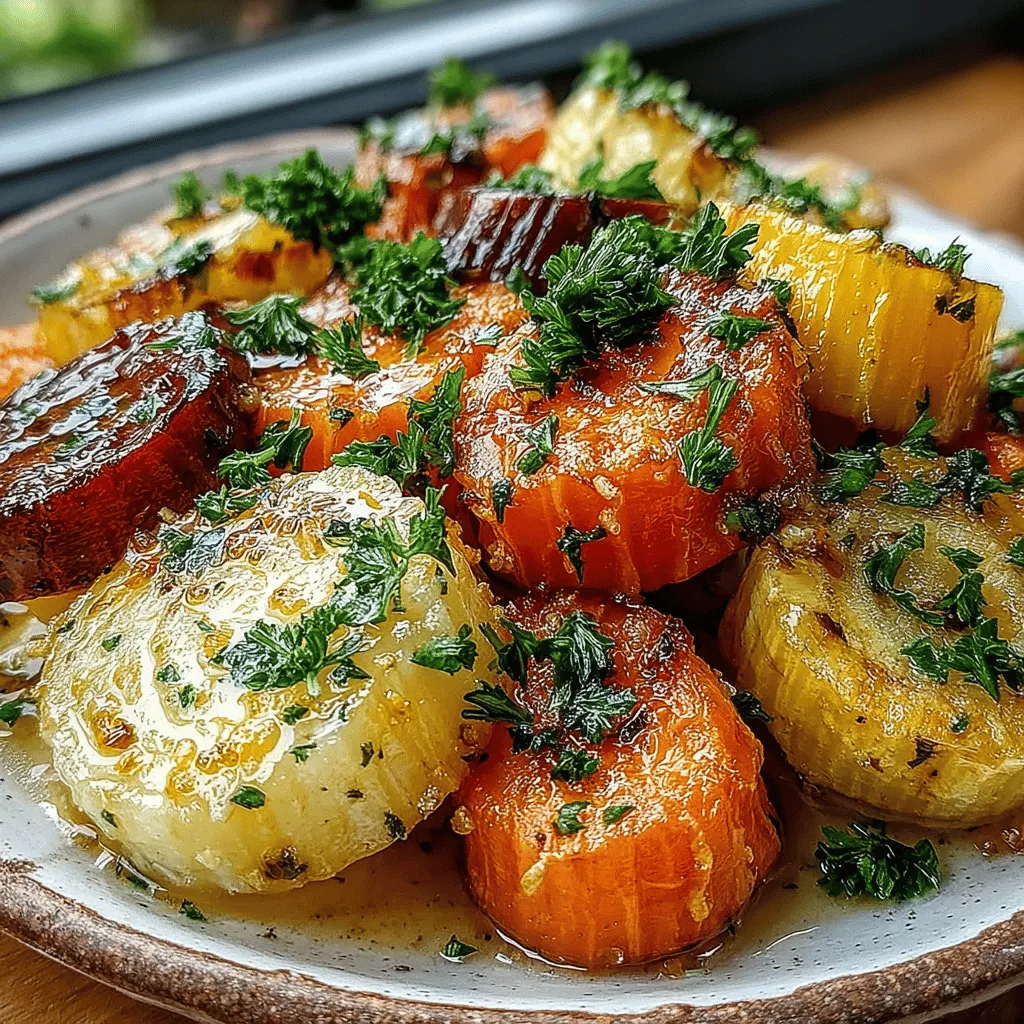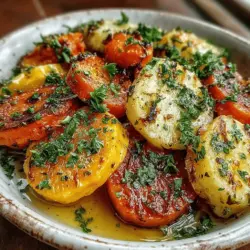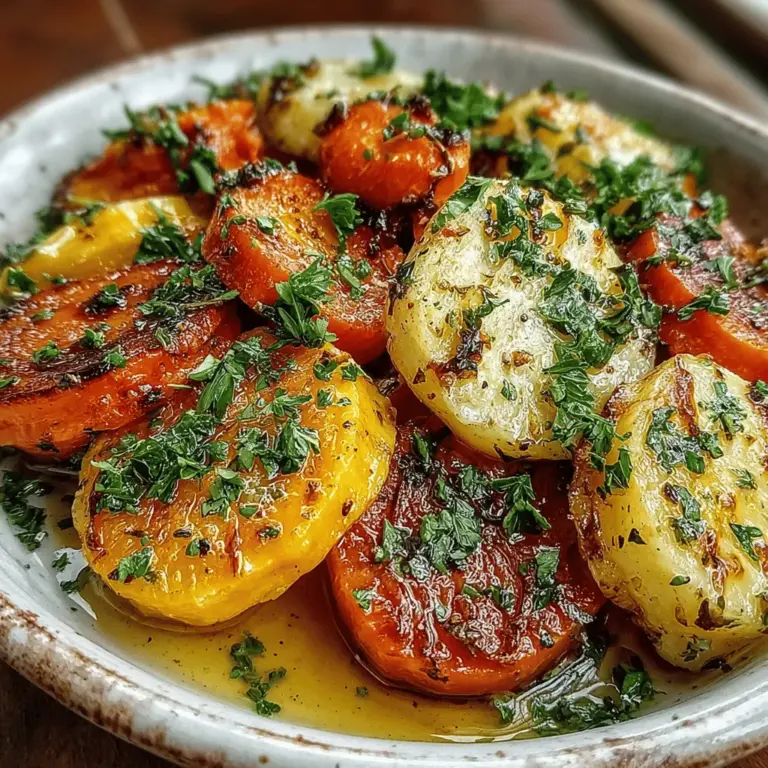Maple Glazed Carrots and Parsnips Recipe
Introduction
Maple glazed carrots and parsnips is a delightful dish that combines the natural sweetness of two root vegetables with the rich, aromatic flavor of maple syrup. This recipe is not only visually appealing, with its vibrant colors, but it also offers a unique taste experience that balances sweet and savory notes. The earthiness of the carrots and parsnips complements the warm, caramel-like essence of maple syrup, creating a dish that is both comforting and sophisticated.
This recipe is incredibly versatile, making it an excellent side dish for a variety of meals. Whether you are serving a holiday feast, a family dinner, or a casual weeknight meal, maple glazed carrots and parsnips can enhance the overall dining experience. The combination of flavors and textures makes it a perfect accompaniment to roasted meats, poultry, or even a hearty vegetarian dish.
Understanding the Ingredients
At the heart of this dish are two simple yet flavorful vegetables: carrots and parsnips. Both are root vegetables that thrive in cooler climates and add a delightful sweetness to any recipe.
Carrots are not only delicious but also packed with nutritional benefits. They are an excellent source of vitamins, particularly vitamin A, which is essential for eye health and immune function. Additionally, carrots provide dietary fiber, which aids in digestion, and antioxidants that can help combat oxidative stress in the body. The natural sugars present in carrots become more pronounced when roasted or glazed, making them a favorite in various culinary traditions.
Parsnips, on the other hand, have a unique flavor that is often described as a sweet, nutty taste, reminiscent of a cross between carrots and potatoes. They are rich in vitamins C and K, as well as important minerals like potassium and magnesium. Like carrots, parsnips are high in dietary fiber, making them excellent for promoting digestive health. Their subtle sweetness intensifies when cooked, making them an ideal companion to the bold sweetness of maple syrup.
Maple syrup plays a crucial role in this recipe, serving as a natural sweetener that enhances the flavors of the vegetables without overpowering them. It adds a depth of flavor that elevates the dish, creating a beautiful glaze that clings to the carrots and parsnips. Moreover, maple syrup is a healthier alternative to refined sugars, containing trace minerals and antioxidants that can contribute to overall well-being.
In addition to these core ingredients, the inclusion of herbs and spices like thyme and cinnamon adds aromatic complexity to the dish. Thyme, with its earthy and slightly minty notes, complements the sweetness of the vegetables, while a hint of cinnamon brings warmth and richness, making this dish feel like a cozy embrace on a chilly evening.
For those looking to add an extra layer of flavor, incorporating a splash of vegetable or chicken broth can enhance the richness of the glaze, creating a more luxurious mouthfeel and deeper flavor profile.
Preparation Steps for Maple Glazed Carrots and Parsnips
The preparation of maple glazed carrots and parsnips is straightforward, making it accessible for both novice and experienced cooks alike. The first step is to gather your ingredients and kitchen tools to ensure a smooth cooking process. You will need fresh carrots and parsnips, pure maple syrup, butter, thyme, cinnamon, and optionally, broth for added depth. A sharp knife, cutting board, and a large skillet or saucepan will also be essential for successful execution.
1. Prep Work: Start by thoroughly washing and peeling the carrots and parsnips. This step not only removes any dirt but also ensures that you begin with clean, fresh produce. After peeling, the next step is to cut the vegetables into uniform pieces. Aim for approximately 1-inch thick slices; this consistency is vital as it ensures even cooking. If the pieces vary in size, some may become mushy while others remain undercooked.
2. Choosing the Right Kitchen Tools: A large skillet or saucepan is ideal for this recipe. A skillet allows for better caramelization due to its larger surface area, while a saucepan can help contain the glaze more effectively. Choose a piece of cookware that you are comfortable with and that offers enough space to fit all the vegetables without overcrowding.
3. Cooking Process:
– Melting Butter: Begin by placing your skillet over medium heat and adding a couple of tablespoons of butter. Allow the butter to melt completely, creating a rich base for sautéing the vegetables. The butter not only adds flavor but also helps in achieving that golden-brown glaze.
– Sautéing Vegetables: Once the butter is melted, add the sliced carrots and parsnips to the skillet. Stir them gently to coat them in the melted butter, ensuring that each piece gets a touch of that rich, creamy flavor. Sauté the vegetables for about 5-7 minutes, stirring occasionally. You want them to start softening and picking up a bit of color.
– Incorporating Maple Syrup and Spices: After the vegetables have begun to soften, it’s time to add the star ingredient—maple syrup. Pour in a generous amount of maple syrup, allowing it to mingle with the butter and vegetables. At this point, sprinkle in your thyme and cinnamon, giving everything a good stir to evenly distribute the spices. If you choose to use broth, add it now to create a lovely glaze that will coat the vegetables.
As you continue to cook, the maple syrup will begin to caramelize, creating a shiny, sticky coating that clings to the carrots and parsnips. Keep an eye on the pan, stirring occasionally to prevent any sticking or burning, and cook until the vegetables are tender and beautifully glazed. This process typically takes about 10-15 minutes, depending on the size of your vegetable pieces and the heat of your stove.
By following these initial steps, you will set the stage for a delicious and visually stunning side dish that is sure to impress at any dining table. The combination of flavors and the ease of preparation make maple glazed carrots and parsnips a go-to recipe for enhancing any meal.

Techniques for Caramelization and Achieving the Perfect Glaze
Caramelizing carrots and parsnips is an art that transforms these humble root vegetables into a sweet and savory side dish. To achieve that perfect glaze, it’s essential to understand the techniques involved in the process.
1. Choose the Right Pan: A heavy-bottomed skillet or sauté pan is ideal for even heat distribution, which helps in caramelizing the vegetables uniformly. Non-stick pans work well, but a stainless-steel or cast-iron pan can give a beautiful golden-brown finish.
2. Cut Uniformly: For even cooking, cut your carrots and parsnips into similar sizes. This ensures that they cook at the same rate, giving you consistent caramelization.
3. Heat Control: Start on medium-high heat to kickstart the caramelization process, and then reduce it to medium or medium-low as you add the maple syrup. This gradual change allows for a perfect balance between browning and cooking through without burning.
4. Use the Right Sweetener: When you add maple syrup, wait until the vegetables have softened slightly before adding it. This prevents the sugars in the syrup from burning and allows them to glaze the vegetables beautifully.
5. Add Butter or Oil: The addition of butter not only enhances the flavor but also helps in the caramelization process by providing a rich, creamy base. If you prefer a dairy-free option, olive oil or coconut oil can be used for a similar effect.
Flavor Enhancements and Variations
To elevate the flavor profile of your Maple Glazed Carrots and Parsnips, consider these variations:
Alternative Sweeteners
While maple syrup is the star of this recipe, other natural sweeteners can also be used:
– Honey: Adds a floral sweetness that pairs beautifully with the earthiness of the root vegetables. Use it in the same quantity as maple syrup.
– Agave Syrup: With a mild taste, agave syrup is another great choice, especially for those looking for a vegan alternative.
Incorporating Additional Herbs and Spices
Spice up your dish with the addition of herbs and spices:
– Rosemary: Fresh or dried rosemary adds a piney aroma that complements the sweetness of the glaze. Add a teaspoon of finely chopped fresh rosemary towards the end of cooking.
– Nutmeg: A pinch of ground nutmeg brings warmth and depth, perfect for fall and winter meals. Use sparingly, as it can be overpowering.
Ideas for Adding Texture
For those who enjoy a bit of crunch, consider adding nuts or seeds:
– Pecans or Walnuts: Chopped and toasted nuts can provide a delightful crunch and additional flavor. Stir them in just before serving.
– Pumpkin Seeds: For a nut-free option, toasted pumpkin seeds give a satisfying texture and a nutritional boost.
Creative Variations
Don’t hesitate to experiment with other root vegetables or seasonal ingredients to create unique flavor combinations:
– Sweet Potatoes: Swap out some or all of the carrots and parsnips for sweet potatoes for a richer, sweeter dish.
– Beets: Their vibrant color and earthy flavor can add visual appeal and taste complexity.
– Seasonal Vegetables: Consider adding turnips or butternut squash in the fall for a seasonal twist.
Serving Suggestions
Maple Glazed Carrots and Parsnips are versatile and can be paired with a variety of dishes. Here are some suggestions to enhance your dining experience:
Ideal Pairings
– Roasted Meats: The sweetness of the glaze complements roasted chicken, turkey, or pork beautifully.
– Grilled Meats: Serve alongside grilled steak or lamb chops for a delightful contrast in flavors.
– Vegetarian Options: These glazed vegetables make an excellent side for hearty vegetarian dishes like lentil loaf or stuffed peppers.
Complementary Dishes
To create a well-rounded meal, consider serving your glazed carrots and parsnips with:
– Grains: Fluffy quinoa or wild rice provide a nutritious base that pairs well with the sweet glaze.
– Salads: A fresh green salad with a citrus vinaigrette can balance the richness of the glazed vegetables.
Presentation Tips
Make your dish visually appealing:
– Color Contrast: Use a white serving dish to make the vibrant colors of the carrots and parsnips pop.
– Garnish: A sprinkle of fresh herbs, like parsley or thyme, adds a fresh look and additional flavor.
Discussion on Portion Sizes and Serving Styles
When it comes to serving, aim for appropriate portions. As a side dish, plan for about ½ to 1 cup of glazed carrots and parsnips per person. If serving at a family gathering, consider a larger platter for guests to help themselves.
Health Benefits of Maple Glazed Carrots and Parsnips
This dish not only tastes delicious but also offers several health benefits:
Overview of the Health Benefits
Carrots and parsnips are both nutrient-rich vegetables. Carrots are high in beta-carotene, which the body converts to vitamin A, essential for eye health. Parsnips are rich in fiber and potassium, promoting digestive health and heart health.
The Role of Healthy Fats
Using butter in the recipe provides healthy fats that aid in nutrient absorption. Fat is essential for the absorption of fat-soluble vitamins, such as vitamins A, D, E, and K, making this dish not just tasty but also beneficial for your health.
Maple Syrup as a Natural Sweetener
Maple syrup is a natural sweetener with a lower glycemic index compared to refined sugars, making it a better choice for those monitoring their blood sugar levels. Additionally, it contains antioxidants and minerals such as zinc and manganese, contributing to your overall health.
Conclusion
Maple Glazed Carrots and Parsnips is a simple yet impressive side dish that can elevate any meal. The combination of sweet maple syrup and the natural earthiness of the root vegetables creates a delightful flavor profile that appeals to both kids and adults alike.
With easy preparation methods and the flexibility to customize flavors, this dish can quickly become a family favorite. Whether you stick to the classic recipe or experiment with different ingredients, the possibilities are endless.
Encourage your family and friends to try this recipe, and watch as it becomes a staple at your dining table. Enjoy the process of cooking and make it a celebration of flavors that everyone will love!

